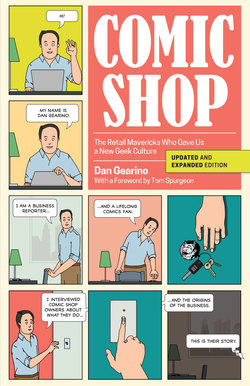Читать книгу Comic Shop - Dan Gearino - Страница 8
На сайте Литреса книга снята с продажи.
ОглавлениеForeword
Almost nothing about the existence of comic shops makes sense.
There is very little money in comics, period. There is less money than that in comic shops. Bookstores carry much of the same material. Nearly everything that you can read in a comic shop can be bought online.
There are no national chain stores that specialize in comic books. In a century defined by giant retail, comic shops stagger forward as a collective of sole proprietorships. They do a job that used to be performed—quite ably—by thousands of steel spinner racks sitting in the dusty corners of drugstores and supermarkets, shouting “Hey, kids! Comics!” When comics faded from mass-market outlets, comic shops rose to help fill the void, a shift that was not by design and far from ideal.
Comic shops are frequently and accurately parodied as bastions of high nerdity: monasteries of geekdom, inscrutable and inaccessible to all but a few true believers. They are historically for boys in a way that has ignored or even been hostile to half of their potential audience. They are few folks’ idea of cool and almost no one’s conception of a sound business decision.
And yet: here they are.
Comic shops were present for the birth and the death of video stores. They lived through the fall and gradual revival of record stores. Their market continues its unlikely growth across the board and is currently the dominant first medium for cross-platform exploitation. Several top-rated TV shows were once something you could buy only in a comic shop. Many top movies can be traced to a collectible back issue. There are even comics taken seriously as art, a notion that at one time seemed more quixotic than any superhero’s quest. Comic shops have been there for those comics, too.
How is any of this possible?
In Comic Shop, Dan Gearino provides a patient, sane, and rigorously examined answer. When did our particular nation of shopkeepers grow ponytails and wrap things in Mylar and make every Wednesday a fantasist’s holiday? What combination of luck and grit allowed some of them to survive? And now, how are the best comic shops evolving to appeal to new audiences? If America’s castle on a hill rests on a foundation of how we buy and sell things, Dan Gearino shows us what’s in the basement. Keep your eyes straight ahead. This isn’t a library. You touch it, you buy it.
Tom Spurgeon
Tom Spurgeon is editor of the Comics Reporter, an Eisner Award–winning website, and author of, most recently, We Told You So: Comics as Art, an oral history of Fantagraphics Books that he wrote with Michael Dean. He also is director of Cartoon Crossroads Columbus, or CXC, a festival of comics and cartoon culture in Columbus, Ohio.
